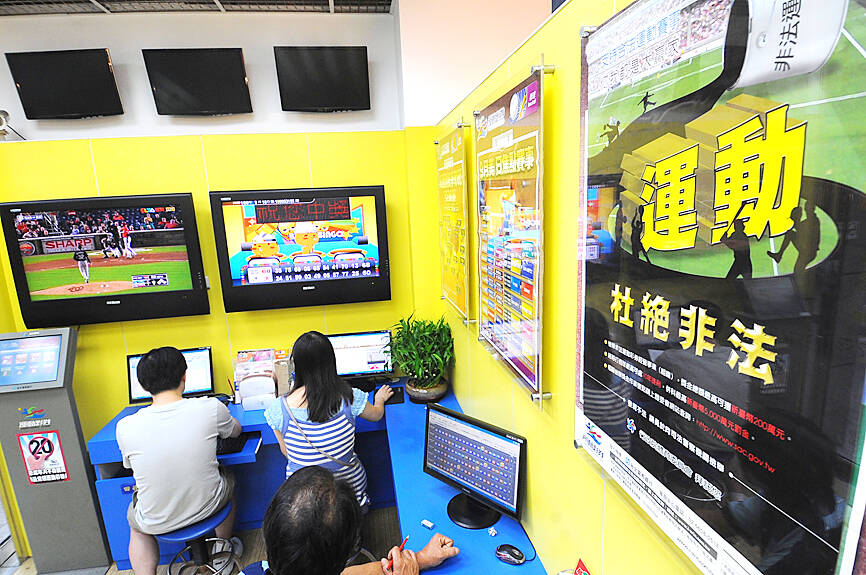The Executive Yuan yesterday approved a proposal to increase penalties for illegal betting and match-fixing, with crimes undermining the fairness of sporting games that lead to the death of an athlete punishable by life imprisonment.
People who manipulate events linked to the Sports Lottery face up to 10 years in prison under the proposed changes to the Sports Lottery Issuance Act (運動彩券發行條例) — which are to be forwarded to the legislature for approval.
If a crime involves violence, coercion or other illegal actions toward an athlete that result in serious injury, the punishment would be increased to three to 10 years in prison and a fine of NT$20 million to NT$50 million (US$608,754 to US$1.52 million).

Photo: Wang Min-wei, Taipei Times
Owners of sports teams, lottery issuers and employees who fail to cooperate with investigations and the judicial process would no longer be punished under the Sports Lottery Issuance Act, but the Code of Criminal Procedure and the Criminal Code, the proposed amendments say.
Surplus revenue from sports lottery sales would be used to train athletes and improve the quality of domestic sports, Premier Cho Jung-tai (卓榮泰) said, adding that the Cabinet has amended articles 21 and 21-1 of the act to ensure that sporting competitions remain fair and people’s interests are protected.
The proposal aligns with the Sport Industry Development Act (運動產業發展條例), as the Taiwan Sports Lottery falls under the umbrella of the sports industry, the Sports Administration said.

LONG FLIGHT: The jets would be flown by US pilots, with Taiwanese copilots in the two-seat F-16D variant to help familiarize them with the aircraft, the source said The US is expected to fly 10 Lockheed Martin F-16C/D Block 70/72 jets to Taiwan over the coming months to fulfill a long-awaited order of 66 aircraft, a defense official said yesterday. Word that the first batch of the jets would be delivered soon was welcome news to Taiwan, which has become concerned about delays in the delivery of US arms amid rising military tensions with China. Speaking on condition of anonymity, the official said the initial tranche of the nation’s F-16s are rolling off assembly lines in the US and would be flown under their own power to Taiwan by way

CHIP WAR: The new restrictions are expected to cut off China’s access to Taiwan’s technologies, materials and equipment essential to building AI semiconductors Taiwan has blacklisted Huawei Technologies Co (華為) and Semiconductor Manufacturing International Corp (SMIC, 中芯), dealing another major blow to the two companies spearheading China’s efforts to develop cutting-edge artificial intelligence (AI) chip technologies. The Ministry of Economic Affairs’ International Trade Administration has included Huawei, SMIC and several of their subsidiaries in an update of its so-called strategic high-tech commodities entity list, the latest version on its Web site showed on Saturday. It did not publicly announce the change. Other entities on the list include organizations such as the Taliban and al-Qaeda, as well as companies in China, Iran and elsewhere. Local companies need

CRITICISM: It is generally accepted that the Straits Forum is a CCP ‘united front’ platform, and anyone attending should maintain Taiwan’s dignity, the council said The Mainland Affairs Council (MAC) yesterday said it deeply regrets that former president Ma Ying-jeou (馬英九) echoed the Chinese Communist Party’s (CCP) “one China” principle and “united front” tactics by telling the Straits Forum that Taiwanese yearn for both sides of the Taiwan Strait to move toward “peace” and “integration.” The 17th annual Straits Forum yesterday opened in Xiamen, China, and while the Chinese Nationalist Party’s (KMT) local government heads were absent for the first time in 17 years, Ma attended the forum as “former KMT chairperson” and met with Chinese People’s Political Consultative Conference Chairman Wang Huning (王滬寧). Wang

CROSS-STRAIT: The MAC said it barred the Chinese officials from attending an event, because they failed to provide guarantees that Taiwan would be treated with respect The Mainland Affairs Council (MAC) on Friday night defended its decision to bar Chinese officials and tourism representatives from attending a tourism event in Taipei next month, citing the unsafe conditions for Taiwanese in China. The Taipei International Summer Travel Expo, organized by the Taiwan Tourism Exchange Association, is to run from July 18 to 21. China’s Taiwan Affairs Office spokeswoman Zhu Fenglian (朱鳳蓮) on Friday said that representatives from China’s travel industry were excluded from the expo. The Democratic Progressive Party government is obstructing cross-strait tourism exchange in a vain attempt to ignore the mainstream support for peaceful development